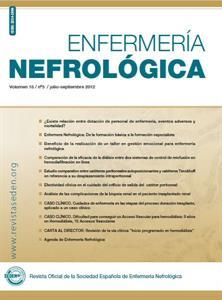Contenido del artículo principal
Resumen
La fase de entrenamiento, en la que se dota a pacientes y cuidadores de los conocimientos y habilidades necesarios para realizar su autotratamiento, es vital.
El objetivo del estudio fue evaluar los conocimientos prácticos de los pacientes de nuestra Unidad mediante la realización de un intercambio manual y como consecuencia de éste, valorar la necesidad de establecer un programa de reentrenamiento reglado.
Se realizó un estudio observacional, transversal entre Febrero y Abril de 2013, con pacientes prevalentes, mayores de edad, con más de un mes en técnica domiciliaria. Se diseñó un test de evaluación de 23 ítems que recogía los pasos de un intercambio
manual y la administración de medicación intraperitoneal; la valoración la realizó un observador imparcial durante una revisión rutinaria del paciente.
Se recogieron variables epidemiológicas, clínicas y nivel de estudios. El análisis estadístico se realizó con el paquete informático SPSS 20.0.
Se evaluaron 62 pacientes, 59 con Enfermedad Renal Crónica (24 en Diálisis Peritoneal Continua Ambulatoria y 35 en Diálisis Peritoneal Automatizada) y 3 con Insufi ciencia Cardiaca Congestiva. El tiempo medio en técnica fue 19±20 meses en manual, 24±27 en automática y 8±4 en ultrafi ltración
peritoneal.
La media de aciertos fue de 18±3, sin diferencias en cuanto a las variables analizadas.
Nuestros pacientes están, en general, bien formados, con variaciones individuales no dependientes de edad, sexo, educación o tiempo en la técnica.
Consideramos que un buen entrenamiento no es suficiente, siendo pertinente establecer un programa de reentrenamientos periódicos y personalizados.
El objetivo del estudio fue evaluar los conocimientos prácticos de los pacientes de nuestra Unidad mediante la realización de un intercambio manual y como consecuencia de éste, valorar la necesidad de establecer un programa de reentrenamiento reglado.
Se realizó un estudio observacional, transversal entre Febrero y Abril de 2013, con pacientes prevalentes, mayores de edad, con más de un mes en técnica domiciliaria. Se diseñó un test de evaluación de 23 ítems que recogía los pasos de un intercambio
manual y la administración de medicación intraperitoneal; la valoración la realizó un observador imparcial durante una revisión rutinaria del paciente.
Se recogieron variables epidemiológicas, clínicas y nivel de estudios. El análisis estadístico se realizó con el paquete informático SPSS 20.0.
Se evaluaron 62 pacientes, 59 con Enfermedad Renal Crónica (24 en Diálisis Peritoneal Continua Ambulatoria y 35 en Diálisis Peritoneal Automatizada) y 3 con Insufi ciencia Cardiaca Congestiva. El tiempo medio en técnica fue 19±20 meses en manual, 24±27 en automática y 8±4 en ultrafi ltración
peritoneal.
La media de aciertos fue de 18±3, sin diferencias en cuanto a las variables analizadas.
Nuestros pacientes están, en general, bien formados, con variaciones individuales no dependientes de edad, sexo, educación o tiempo en la técnica.
Consideramos que un buen entrenamiento no es suficiente, siendo pertinente establecer un programa de reentrenamientos periódicos y personalizados.
Palabras clave
Diálisis peritoneal; Autocuidado; Entrenamiento; Reentrenamiento.
Detalles del artículo
Licencia
Aviso de derechos de autor/a
© Los autores ceden de forma no exclusiva los derechos de explotación de los trabajos publicados y consiente en que su uso y distribución se realice con la Licencia Creative Commons Atribución - No comercial 4.0 Internacional (CC BY-NC 4.0). Puede consultar desde aquí la versión informativa y el texto legal de la licencia. Esta circunstancia ha de hacerse constar expresamente de esta forma cuando sea necesario.
Cómo citar
1.
Pelaéz Requejo B, Fernández Pérez M, Núñez Moral M, González Díaz I, Méndez González A, Quintana Fernández A. Evaluación de los conocimientos prácticos de los pacientes prevalentes en diálisis peritoneal. Enferm Nefrol [Internet]. 2013 [consultado 11 Sep 2025];16(3):[aprox. 6 p.]. Disponible en: https://enfermerianefrologica.com/revista/article/view/4196




